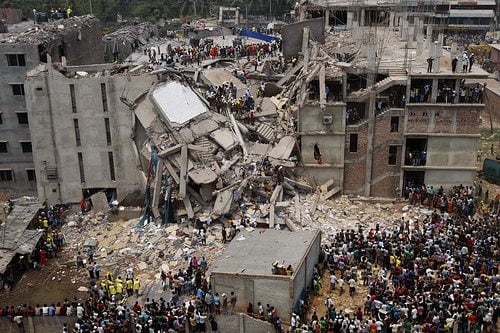

News
Matalan criticised for refusing to donate to Rana Plaza compensation fund
Clothing retailer Matalan has been targeted by campaigners for failing to donate money to a compensation fund for victims of the Rana Plaza factory disaster.
On April 24 2013, the factory collapse in Dhaka, Bangladesh, killed 1,129 garment workers and injured more than 2,500.
The factory supplied many goods to high-profile brands, such as Gap, H&M and Primark, that were accused of ignoring the health and safety of workers in developing countries.
In the face of international outrage, leading retailers whose products were made in Rana Plaza pledged to donate to a UN-backed compensation fund for relatives of the victims.
Now, Matalan remains the only affected major British retailer not to have committed its support to the $40 million (£23.5) fund. It has been asked to contribute £3 million, a small portion of its annual sales.
Instead, the firm has said it will donate an undisclosed fee to the Rana Plaza Survivors Rehabilitation Scheme, which is managed by the Bangladeshi organisation BRAC.
However, critics say this is not enough.
“Matalan may have made peppercorn donations to other charities, but that’s no substitute for the proper compensation it owes to the survivors of the Rana Plaza disaster,” said David Babbs, executive director of the protest platform 38 Degrees.
“If Matalan wants to carry on selling its clothes to Britain’s mums and dads, it needs to convince them that its family-friendly image is more than clever PR spin. Paying the money it owes to the families of the Rana Plaza disaster would be a good place to start.”
Through 38 Degrees, activists have launched a new petition, calling on Matalan to donate its fair share to the official fund.
The organisation warns that time is running out, as unless Matalan donates by Thursday, some Rana Plaza survivors will not receive compensation.
The petition has so far gathered 38,400 signatures, nearing its 50,000 target.
After the disaster, subsequent investigations found that some garment staff in Bangladesh worked up to 19 hours per day, earning less than £40 a month.
Though some steps have been taken to improve this, campaigners warn much must still be done to improve ethics and human rights along the fashion supply chain.
Photo: rijans via Flickr
Further reading:
Dutch shoppers worried about how clothes are made after Rana Plaza disaster
On this day in 2013: Rana Plaza disaster kills 1,138 Bangladeshi garment workers
Fashion Revolution Day to promote supply chain issues on Rana Plaza anniversary
Employers agree on a 77% wage increase for Bangladesh factory workers
Compensate Bangladesh factory collapse victims, demand campaigners


 Environment12 months ago
Environment12 months agoAre Polymer Banknotes: an Eco-Friendly Trend or a Groundswell?

 Features11 months ago
Features11 months agoEco-Friendly Cryptocurrencies: Sustainable Investment Choices

 Features12 months ago
Features12 months agoEco-Friendly Crypto Traders Must Find the Right Exchange

 Energy11 months ago
Energy11 months agoThe Growing Role of Solar Panels in Ireland’s Energy Future





























